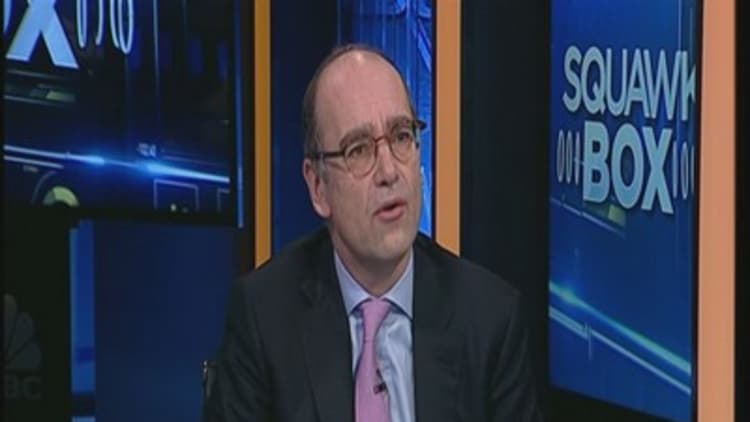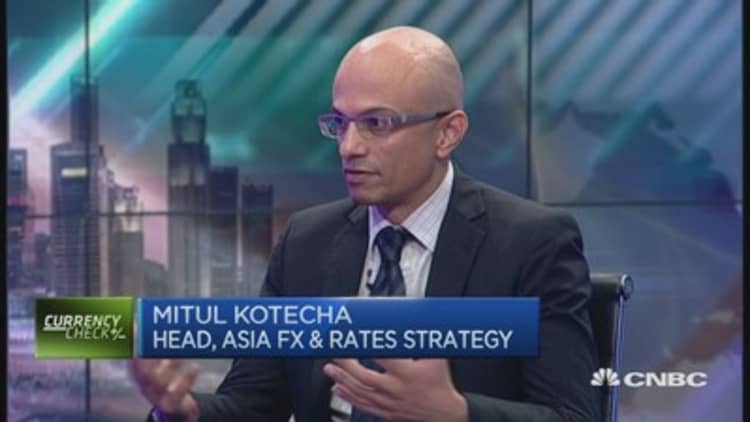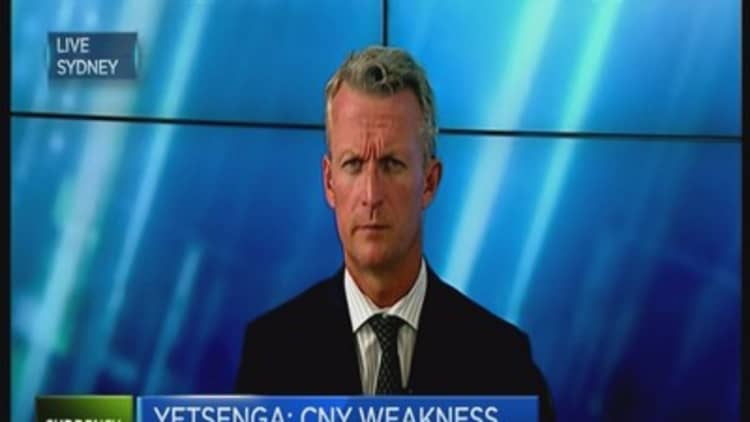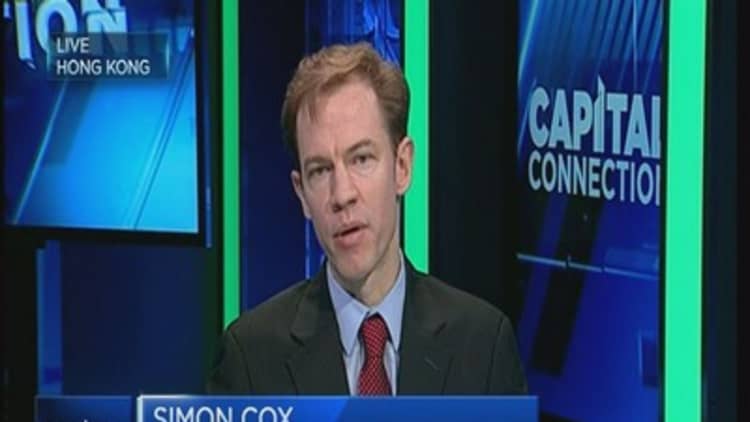



Amid global market turmoil, Hong Kong's stocks and its tightly controlled dollar have taken an outsized tumble this week, spurring speculation the currency peg may snap.
Hong Kong's markets are hurting due to a confluence of factors. The special administrative region's trade and financial ties to China, once a source of strength, have now become a liability as the mainland grows at its slowest pace in 25 years. Despite the plunge against the greenback, the Hong Kong dollar still remains expensive against peers such as the South Korean won, creating headwinds for exports.
Investors have also taken fright at hefty capital outflows.
On Thursday, the Hang Seng Index dropped 1.82 percent, extending Wednesday's 3.8 percent tumble, hitting its lowest since mid-2012, during the European debt crisis. The HSCEI, or the Hang Seng China Enterprises Index, lost 2.24 percent Thursday after dropping 4.32 percent Wednesday.
Outflows from the market pushed the Hong Kong dollar (HKD) to its lowest level since August 2007, with the U.S. dollar fetching as much as HK$7.8241. The Hong Kong Monetary Authority (HKMA) has pegged its exchange rate to a HK$7.75 to HK$7.85 range against the U.S. dollar.
Although the currency didn't leave its range, that spike spurred renewed speculation that the peg could snap. To be sure, bets the peg isn't long for this world have cropped up perennially throughout its 32-year history without any sign the peg is anything but firm.
"Hong Kong -- the HKMA, and the Hong Kong government -- have a track record of defending the peg and maintaining the financial integrity of Hong Kong and I don't see that that's going to change anytime soon," Richard Titherington, chief investment officer and head of Asia-Pacific equities at JPMorgan Asset Management, told CNBC's Squawk Box Thursday. "There's no reason to think the peg is going to break."
That hasn't stopped the speculators from laying chips on it, said Angus Nicholson, a market analyst at spreadbettor IG, in a note Thursday.
"While the HKD has withstood rampant speculation before during the Asian Financial Crisis and the SARS crisis, short bets face at worst a move to HK$7.75 (the band being HK$7.75-HK$7.85) against them and anywhere from a 20-50 percent upside if the peg were broken," Nicholson said. "The risk-reward balance of the trade makes it compelling even if it has a low likelihood of eventuating."
The protectorate also faces pressure from outflows, particularly from its stock market. The drop in the HSCEI -- Hong Kong-listed shares of large China companies -- is pressuring derivatives tied to the index, particularly from South Korean investors, the Financial Times reported Wednesday.
Around $40 billion worth of HSCEI-tied "autocallables" -- a type of structured derivative product that pays investors capital and interest if the index stays within a stated band, but creates losses below that level -- were outstanding at the end of 2015, Korea Securities Depository data show, the FT reported. The index level at which most investors will feel the pain is around 7,800, the FT reported -- that's within spitting distance of Thursday's close at 7,835.64.
For foreign investors in Hong Kong, the Hong Kong dollar peg may also boost the attractiveness of selling the protectorate's assets. While the peg kept the local currency steady against the greenback, competing currencies around the region have dropped.
Against South Korea's won, for example, the greenback is more than 3 percent stronger just since the start of the year. That means a South Korean investor would see foreign-exchange gains when selling Hong Kong dollar assets and converting back into won.
There's another reason for the drubbing in Hong Kong: For many investors, it's just too hard to bet against mainland China.
China restricts the flow of capital to and from the mainland markets, making it difficult for many investors to buy and sell stocks there without jumping through regulatory hoops. At the same time, regulators recently put the kibosh on bets the yuan would depreciate, pushing up the in offshore markets. Suspected interventions by the PBOC in Hong Kong's offshore market for yuan has also reduced the amount of spare renminbi in the system, pushing up overnight yuan borrowing rates in yuan to record highs.
Hong Kong, a special administrative region of China, has close economic ties to the mainland, but its market is open.
"Hong Kong is increasingly the fault line where strict Chinese government controls and intervention meet (relatively) freely traded global markets," IG's Nicholson said.
Hong Kong's stocks have another headwind: Investors also aren't terribly positive on the fundamentals of the market.
Goldman Sachs, for one, only expects Hong Kong stocks to post earnings per share growth of 5 percent and 3 percent for 2015 and 2016 respectively, citing forecasts the protectorate's economy will expand just 1.6 percent this year, its slowest since 2010 amid unemployment concerns.
"Valuations are admittedly at the low-end of the historical ranges but are mainly reflective of a deteriorating micro growth profile," Goldman said in a note Thursday.
—By CNBC.Com's Leslie Shaffer; Follow her on Twitter @LeslieShaffer1





